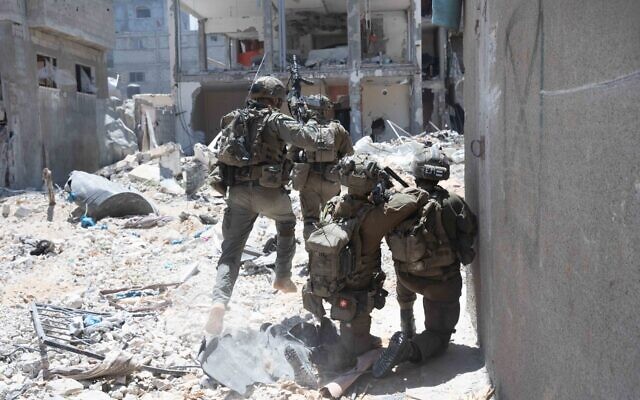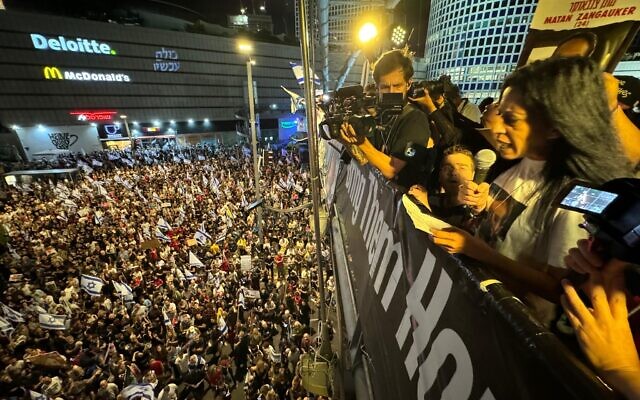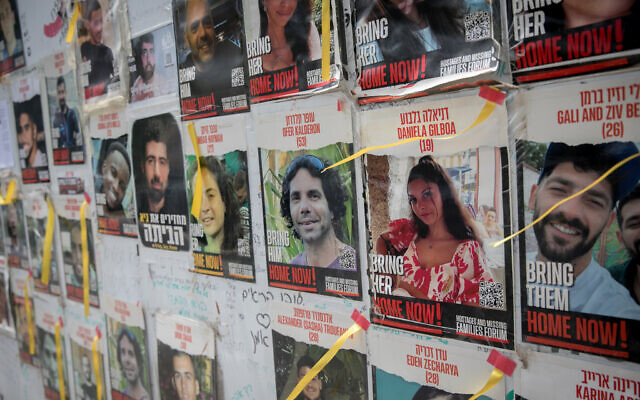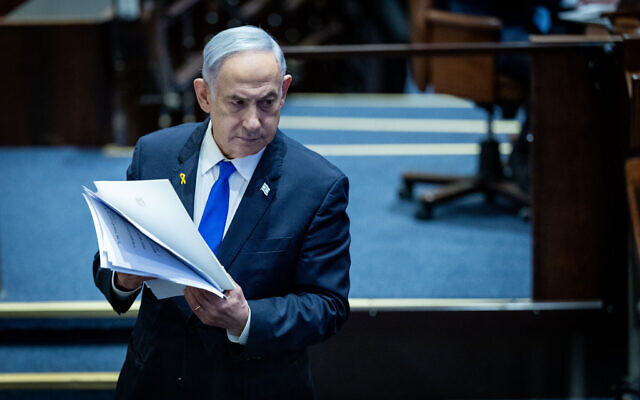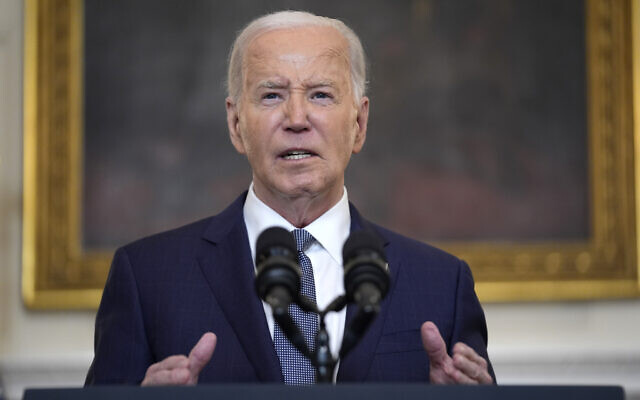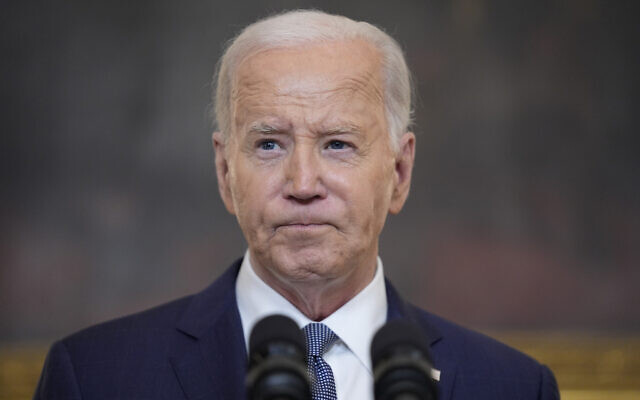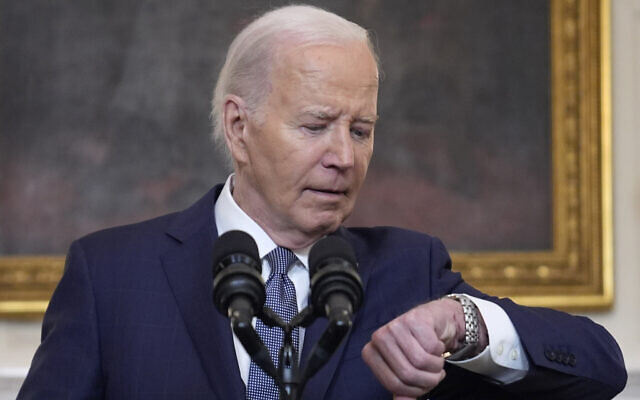‘Didn’t fall from the sky’: Biden threat follows months of feeling PM ignored his warnings
Explaining president’s radical shift, US officials say president kept up regular arms deliveries since Oct. 7 but the Israelis ‘knew this wasn’t going to be able to go on forever’

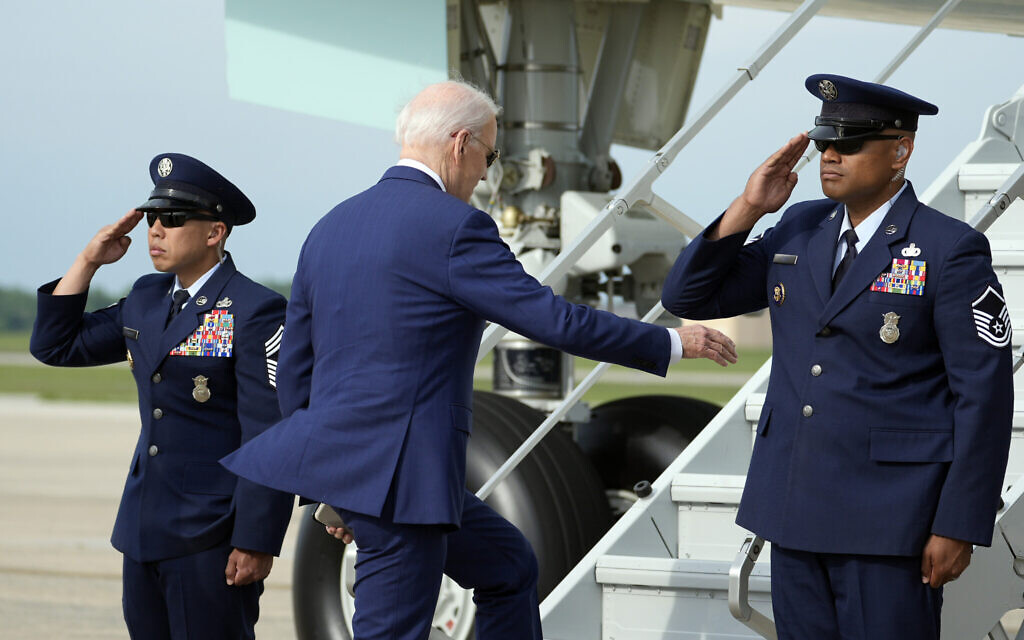
Four years ago this month, then-presidential candidate Joe Biden pledged to a group of donors that he would not place conditions on American security assistance for Israel if elected, calling such a move “irresponsible” given the threats facing the Jewish state.
In late November — nearly two months into what already was the bloodiest Israel-Hamas war in Gaza yet — Biden stood by that stance, as he bucked calls from progressive lawmakers in his party to tie US security assistance to Israel’s human rights record. “I don’t think if I started off with that, we’d have ever gotten to where we are today.”
Five months on, Biden has radically changed his approach.
“If they go into Rafah… I’m not supplying the weapons that have been used historically to deal… with the cities, to deal with that problem,” Biden told CNN on Wednesday. “They’re not going to get our support if they go [into] these population centers.”
The comments shook the political arenas in the US, Israel and beyond. US officials explaining the threat asserted that it should not have come as a surprise to Prime Minister Benjamin Netanyahu or anyone following the situation closely.
“The president and his team have been clear for several [months] that we do not support a major ground operation in Rafah where more than one million people are sheltering with nowhere safe to go,” White House National Security Council spokesperson John Kirby said Thursday, noting that this message was conveyed publicly and privately to Netanyahu. “The Israeli government has understood this for some time now.”

Since Netanyahu began threatening a Rafah offensive in February, the US has stressed that it would not be able to support such an operation without a credible plan to evacuate the civilians sheltering there and provide for their humanitarian needs once moved. Three months have passed and the White House still maintains that Israel never put together such a plan, while Israel contends it’s never been presented with viable alternatives to defeating Hamas without entering Rafah.
The request joined several others repeatedly issued by the US since the war’s outbreak. The Biden administration has urged Israel to take steps to limit civilian casualties, prevent a humanitarian crisis, protect aid workers and advance viable alternatives to Hamas rule.
But the feeling in Washington was that those requests were overwhelmingly ignored by Netanyahu and the Israeli government, two US officials told The Times of Israel.
Civilian casualties
One of the officials highlighted the ever-climbing casualty count in Gaza. Hamas’s health ministry puts the death toll near 35,000, though the figure cannot be verified and doesn’t differentiate between civilians and combatants, while including civilians killed by terrorists’ errant rocket fire. The IDF says it has killed over 13,000 Hamas and other gunmen in Gaza, along with 1,000 terrorists inside Israel during the terror group’s October 7 onslaught that started the war.
Pictures and videos of children buried under the rubble of Gaza buildings targeted by Israel have piled up and had an impact on decision-makers in the administration as well, the official said.
“Civilians have been killed in Gaza as a consequence of those bombs and other ways in which [Israel] goes after population centers,” Biden told CNN when asked “Have those bombs been used to kill civilians in Gaza,” explaining his decision to hold up a shipment of high payload munitions to Israel last week. “It’s just wrong. We’re not going to supply the weapons and artillery shells.”
The US official acknowledged the difficulty Israel faces fighting an enemy that embeds itself deep within civilian populations after massacring some 1,200 people in southern Israel and taking 252 hostages on October 7.
But the Biden administration has given Jerusalem seven months of unconditional support and cannot maintain it, the US official argued, citing the civilian casualties in Gaza and the destabilizing nature the war has had on the region. The official clarified that this does not change Washington’s commitment to secure a truce deal that would see the release of the 132 hostages still in Gaza.

Aid and deconfliction
As for humanitarian assistance and deconfliction, the two US officials said it took until the mistaken IDF strike that killed seven World Central Kitchen workers on April 1 for Israel to implement a series of measures to significantly expand the amount of aid entering Gaza and protect the people delivering it.
The past month regularly featured days where nearly 400 trucks of aid entered the Strip — still 100 trucks less than the daily average before the war, but the maritime route is expected to be operational in the coming days and Washington says it will cover that difference.
The uptick in aid has been difficult to maintain, though, dropping again this week as Israel began a limited operation to take over the Palestinian side of the Rafah Crossing, shutting it down for the delivery of aid.
Israel also closed its nearby Kerem Shalom Crossing into Gaza after a Hamas attack from Rafah over the weekend killed four IDF troops and wounded 10 others stationed nearby. The crossing was reopened on Wednesday when another soldier was wounded there by a Hamas rocket barrage, but the number of aid trucks passing through has been far more limited since.
The second US official told The Times of Israel that concerns of another downward trend in aid delivery, just as fears over a potential famine in northern Gaza had eased, was on top of mind for the administration in the days leading up to Biden’s CNN interview.

Day after
Another issue the Biden administration has harped on since the days after October 7 was the necessity for Israel to immediately begin planning for who will take over Gaza once the war ends.
“We’ll help you get [Hamas leader Yahya] Sinwar,” Biden recalled telling Netanyahu during the CNN interview.
“But don’t make the same mistake we made in America [after 9/11],” the president added, lamenting what he felt had been the US’s inability to plan strategically upon invading Afghanistan and Iraq.
“We’ve got to think through what is happening after this is over. Who is going to occupy Gaza?” Biden said.
The US envisions its Arab partners assisting in the security and economic revival of Gaza in the immediate aftermath of the war until a reformed Palestinian Authority is ready to take the helm.
But those countries have conditioned any post-war support on Israel agreeing to establish a pathway to a future Palestinian state — something Netanyahu has rejected out of hand.
The US has tried dangling the willingness of one of those Arab partners — Saudi Arabia — to normalize ties with Israel, hoping that might convince Netanyahu to cooperate with the effort.
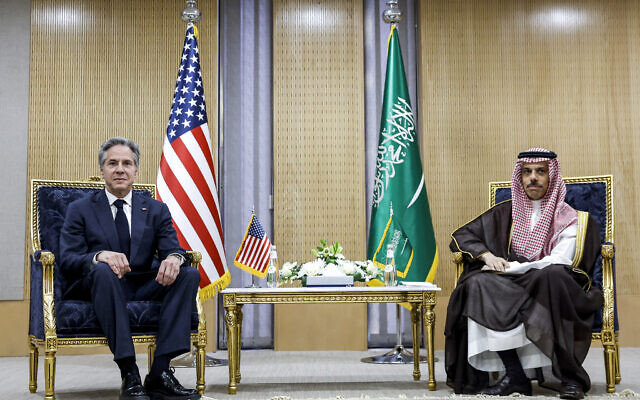
But he has refrained from even holding substantive cabinet discussions on the matter due to concerns they could collapse his coalition.
Netanyahu’s far-right coalition partners have called for Israel to permanently occupy Gaza and reestablish settlements in the Palestinian territory. The premier has signaled his opposition to these steps but has been criticized for blocking clear alternatives to Hamas’s rule, leaving US officials concerned that Gaza will either remain in Hamas’s hands or will be governed by anarchy.
Finally, after Biden’s threat on Wednesday, the Kan public broadcaster reported that Netanyahu agreed to hold a war cabinet meeting to discuss the post-war management of Gaza.
“We’ve been pushing the Israelis to discuss day-after from the get-go, and we’ve been completely ignored. As a result, Israeli soldiers are returning a second and third time to the same areas they previously cleared Hamas fighters from,” said the second US official.
“All throughout this, we continued regular shipments of weapons, but they knew this wasn’t going to be able to go on forever,” the official continued. “The president’s comments [to CNN] didn’t fall from the sky.”
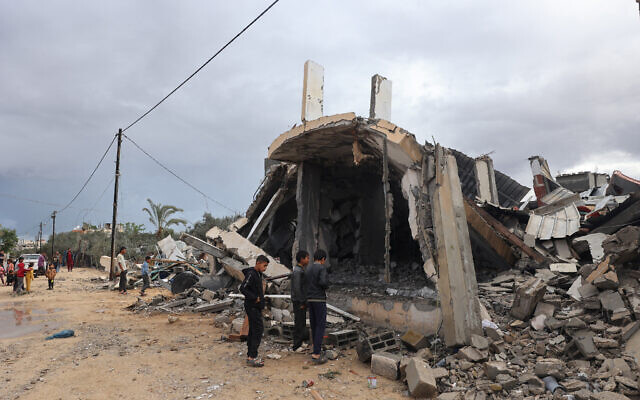
Under pressure
US officials believe that Biden’s threat on Thursday was the unavoidable result of Israel ignoring requests from its biggest benefactor for months.
The US official rejected the notion that the threat was part of a politically motivated effort to appease progressives whom Biden might need in order to get re-elected. The president said in the CNN interview that he “absolutely” heard the pro-Palestinian students protesting against Israel, before hinting they were far less representative than they seem.
Motivations aside, what appears less clear is how the president’s shift will impact the effort to release the hostages and defeat Hamas — goals that Washington insisted Thursday that it won’t abandon.
In that same press conference five months ago when he defended his refrain from conditioning aid to Israel, Biden was asked whether he trusted Hamas to abide by that first hostage deal that the sides had just inked.
“I don’t trust Hamas to do anything right. I only trust Hamas to respond to pressure,” he replied.
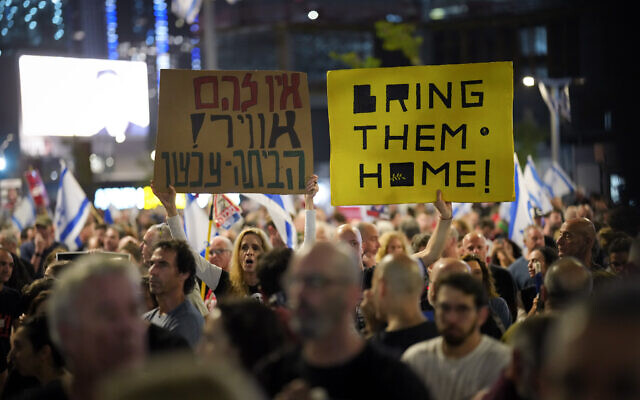
Israel has long stressed this point and its leaders warned after Biden’s CNN interview that Hamas now has less of an incentive to compromise in the hostage talks, since it knows the US won’t support the IDF invading Rafah to dismantle its remaining battalions.
Administration spokespeople asserted Thursday that a Rafah offensive would actually strengthen Hamas’s hand at the negotiating table because it would use a further increase in civilian casualties to make more far-reaching demands, while also saying the terror group “never cared about Palestinian civilian lives.”
Elaborating on the stance, the US official said Hamas has not shown any indication in the hostage negotiations that it would be swayed by the potential military losses it might face as a result of the IDF invading Rafah.
Are you relying on The Times of Israel for accurate and timely coverage right now? If so, please join The Times of Israel Community. For as little as $6/month, you will:
- Support our independent journalists who are working around the clock;
- Read ToI with a clear, ads-free experience on our site, apps and emails; and
- Gain access to exclusive content shared only with the ToI Community, including exclusive webinars with our reporters and weekly letters from founding editor David Horovitz.

We’re really pleased that you’ve read X Times of Israel articles in the past month.
That’s why we started the Times of Israel eleven years ago - to provide discerning readers like you with must-read coverage of Israel and the Jewish world.
So now we have a request. Unlike other news outlets, we haven’t put up a paywall. But as the journalism we do is costly, we invite readers for whom The Times of Israel has become important to help support our work by joining The Times of Israel Community.
For as little as $6 a month you can help support our quality journalism while enjoying The Times of Israel AD-FREE, as well as accessing exclusive content available only to Times of Israel Community members.
Thank you,
David Horovitz, Founding Editor of The Times of Israel


